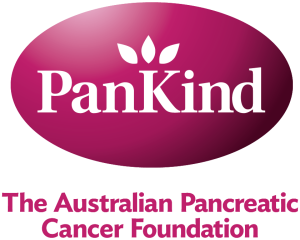Early Detection research projects

Since our inception, PanKind have been committed to funding impactful research that furthers the understanding of pancreatic cancer, including projects to detect the cancer earlier and provide better treatment options to improve survival outcomes.Our Early Detection Initiative demonstrates our increased focus and commitment to driving research that will quickly progress early detection for pancreatic cancer.
Michelle Stewart, PanKind CEO says “We are extremely proud to launch the PanKind Early Detection Initiative and immediately announce $465,000 in funding for two new research projects led by QIMR Berghofer Medical Research Institute and The Jreissati Family Pancreatic Centre at Epworth, to increase the proportion of patients diagnosed with operable disease through early detection. PanKind hope this initial funding opens the doors for increased focus and further funding into the early detection of pancreatic cancer.”
The project led by QIMR Berghofer is an Australian-led international research collaboration with a specific focus on early detection of pancreatic cancer, involving over 13 groups of scientists, clinicians and policymakers in Australia, New Zealand and the US. Professor Rachel Neale, Head of the Cancer Aetiology and Prevention Laboratory at QIMR Berghofer Medical Research Institute, is the Principal Investigator for an exciting new approach to pancreatic cancer detection.
“Unfortunately screening all Australians for pancreatic cancer is not a viable option. Instead, we are looking to identify who is most at risk of pancreatic cancer and to determine whether monitoring this group would lead to better outcomes. Hopefully that will enable us to detect and treat pancreatic cancer earlier and learn more about the disease. To do this we will be linking the national data of thousands of patients who had pancreatic cancer over the last 15 years. We will use sophisticated machine-learning methods to predict people’s risk of pancreatic cancer. By making the most of existing data we can hopefully understand more about the disease faster,” says Professor Neale.
This project also focuses on reducing delays in diagnosis in general practice. Many patients and families tell stories of a distressing journey to diagnosis of pancreatic cancer. It is important that the extent, causes, and consequences of this are quantified, and that patients and general practitioners are supported to ensure prompt diagnosis. The project team has already developed a preliminary decision support tool. During this project, the tool will be further refined and made available for use by clinicians and consumers. This component of the study will be supported by Viatris, a global healthcare company focused on empowering people worldwide to live healthier at every stage of life.
The second project is led by Associate Professor Andrew Metz at the Jreissati Family Pancreatic Centre at Epworth. Funded in partnership with Tour De Cure and the Woolworths Wheels and Walks collaboration, this project, for the first time, brings together the disciplines of gastroenterology and endocrinology to unify their different perspectives of pancreatic disease. Previous research has shown there is a link between pancreatic cancer and late onset diabetes, and understanding the specific factors that lead to a diagnosis of pancreatic cancer for a small group of these people with diabetes, may provide us with a novel and cost-effective screening test.
"We know malignant pancreatic disease is very difficult to diagnose. We know there's data that shows pancreatic cancer patients have presented to their GP a minimum of three to six times before pancreatic cancer has been considered. A cost-effective screening test will likely save lives," says Associate Professor Metz.
Help fund Early Detection research - Make a Tax time donation



